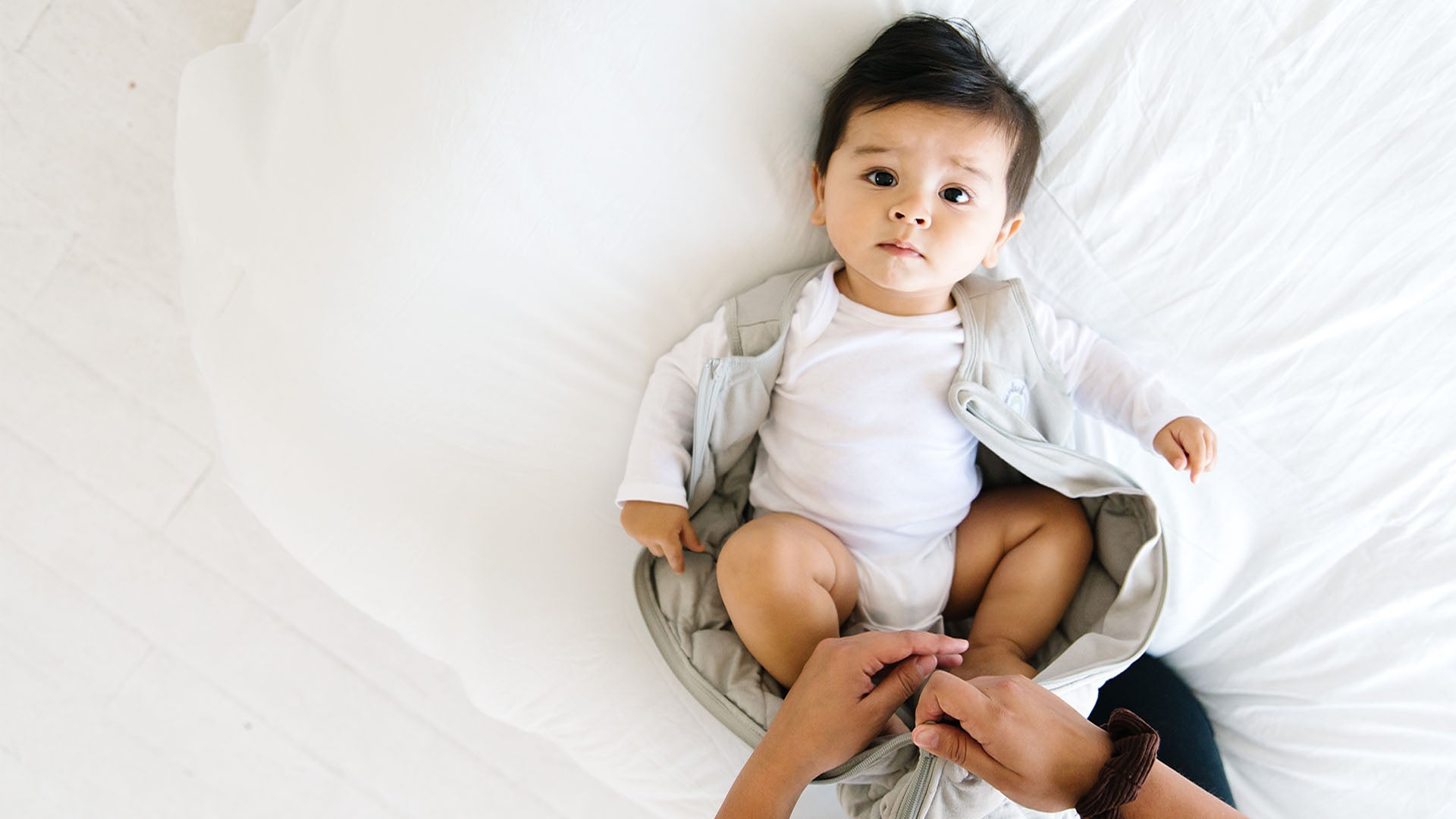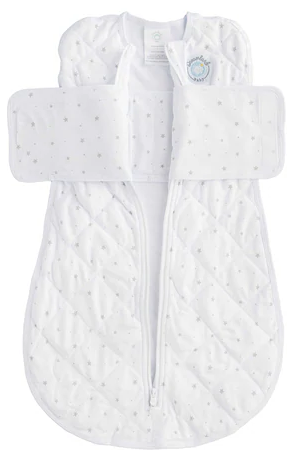Let's Understand the Ideal Sleeping Patterns for 9-Month-Old Babies
As you fight through the long sleepless nights. . . you may be wondering when things will get better. With a 9-month-old sleep schedule can change, and hopefully for the better.
When a baby turns 9-months-old, they are likely to sleep through most or all of the night. Hallelujah! But they will still require plenty of nap times.
So, what’s the best sleep schedule for a 9-month-old? Here are a few tips that will help you and your baby get into a natural rhythm.
What is the best sleep schedule for a 9-month-old?
At 9 months of age, babies should be sleeping 14 hours a day. This includes 11-12 hours of sleep at night and 2-3 hours of sleep during the day to be split over 2 naps.
Experts recommend that children get between 2 ¾ hours to 3 ½ hours of awake time between naps and sleeping.
How do you get a 9-month-old baby on a sleep schedule?
Hopefully by now, you have figured out how to put your baby to sleep and keep them asleep. Being able to get your baby to sleep will help you form a consistent schedule. If you’re struggling to get your baby calm, try Dreamland’s Weighted Blankets and Swaddles. Dreamland products are a key resource for sleep-deprived parents, desperately trying to get their baby on a sleep schedule.
Here are some additional tips for developing a 9-month-old baby sleep schedule:
- Keep your baby active: Keeping your baby stimulated and active can help prepare them for sleep. Some babies may respond to activities close to nap or bedtime, while others may struggle to calm down. If your baby struggles to calm down, try Dreamland products. . . they work like a dream.
- Prepare your baby for sleep: Reading a book or taking a bath can be two before-bed activities that can help relax your baby and prepare them for bed. Adding a before-bed activity into your routine can give your baby something to look forward to, making bedtime more exciting.
- Avoid an overtired baby: If your baby is overtired, they may become cranky during sleep time and they may sleep fitfully. You can avoid overtiredness by putting your child to bed early to ensure he or she gets their full 11-12 hours. If they are tired during the day, allow for extra naptime.
- Limit naptime: While you won’t want your child to be overtired, you also won’t want them to nap too much. If they sleep excessively, they won’t be tired at bedtime. To keep them on schedule, cap nap times so they never exceed four hours a day.
- Try to get your baby to sleep in the crib: Babies are known to fall asleep in strollers and car seats. While the occasional stroller nap is not a big deal, it’s best to get them to sleep in their crib whenever possible. This will allow them to sleep more soundly. It can also help establish a consistent sleep routine.
- Stay consistent: If your baby starts to fuss during nap time or sleep time, you may go to their crib to try and soothe them. But avoid taking them out of their bed to engage in other activities. You may just form a habit that’s hard to break.
Is there a 9-month sleep regression?
It can be tricky to get babies to stick to a 9-month-old sleep schedule due to 9-month sleep regression.
At 9 months, babies deal with various developmental issues that can make it difficult for them to fall asleep and stay asleep. Even babies that have historically been good sleepers may wake up often during the night when they reach the 9-month milestone. Issues that lead to sleep regression include:
- Teething
- Developmental milestones that make them eager to get up and explore
- Temperament (some babies may be sensitive to noise and light, or their internal clocks may be telling them it’s time to get up)
- Hunger
Parents can deal with 9-month sleep regression by:
- Create a soothing environment with just the right temperature, lighting, and sounds.
- Use common remedies to deal with teething issues.
- Supplement diet to keep your baby full, longer.
- Adjust the baby’s bedtime. Move it around so it’s earlier or later until you find their sweet spot.
- Try using a weighted sleep sack or swaddle. Weighted sleep sacks and swaddles can help your baby feel calm, fall asleep faster, and stay asleep longer.
What time should a 9-month-old go to bed?
Generally, mothers setting a sleep schedule for a 9-month-old should aim to get their baby to bed around 7 o’clock. But if your child is having trouble sleeping, you may consider moving their sleep time a little earlier or a little later.
What is the best 9-month-old nap schedule?
A 9-month-old baby sleep schedule should include time for naps. Schedules can vary depending on personal schedules, but an ideal 9-month-old nap schedule could look like:
- 6:00 AM: Baby wakes up
- 8:45 – 10:15 AM: First nap
- 1:45 – 3:15 PM: Second nap
- 7:00 PM: Bedtime
This leaves about 3.5 hours of awake time between sleep times, an ideal window for 9-month-old babies.
What should parents expect in the next stage of sleep?
Babies will stick to their 9-month-old sleep schedule for quite some time. Although some people think that babies will only need one nap when they reach the 10–12-month stage, this usually isn’t the case. Children this age will still require about 14 hours of sleep a day.
So how can you tell when your child is ready to switch things up? If you notice your child is protesting excessively when you put them down to sleep or if they wake up often during the night, you may consider changing their sleep schedule. There is no definite age when this occurs. It depends on the child.
Tips for 9-month-old sleep schedules:
In summary, to get your child to stick to their 9-month-old sleep schedule, you should:
- Keep them on a schedule
- Prepare them for bed with activities that will tire them out
- Keep them in their crib during sleep time whenever possible
- Avoid overtiring them, but don’t let them sleep too much either
- Soothe them when necessary but don’t get them out of their bed
- Address teething concerns
- Promote a soothing atmosphere in the bedroom
- Use a weighted sleep sack or swaddle
While we can offer up all the tips in the world, it’s important to remember that babies are all different - and that’s a beautiful thing. Maybe your first born was a superstar sleeper but baby number two is giving you a hard time. After three babies, Tara Williams, a supermom just like you, thought she had it all figured out. But baby number four fought sleep to the point of exhaustion. Tara tried everything, and it seemed like nothing would work, that is until she placed a heavy throw blanket on top of her baby.
And just like that, Dreamland’s mission was born. Dreamland’s mission is to use the highest quality materials and adhere to stringent safety standards to craft weighted sleep solutions that help babies feel calm, fall asleep faster and stay asleep longer. Dreamland offers a Weighted Sleep Sack and Weighted Swaddle, both featuring our CoverCalm Technology that evenly distributes weight from your baby’s shoulders to toes to naturally reduce stress and increase relaxation. Dreamland can make putting your baby to sleep a breeze, thus making it easier to get on a consistent schedule.





Share:
How (and when!) to Transition Your Baby Out of a Swaddle
The Best Sleep Sacks For Your Baby